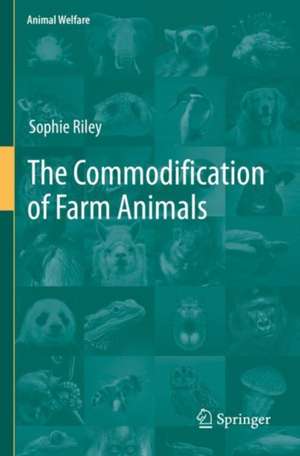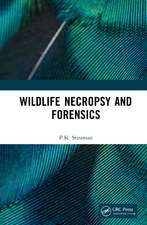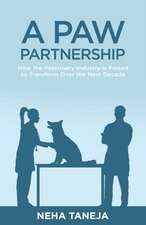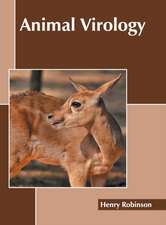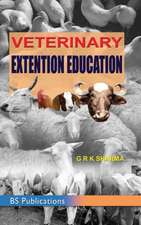The Commodification of Farm Animals: Animal Welfare, cartea 21
Autor Sophie Rileyen Limba Engleză Paperback – 17 feb 2023
The topic of this book will appeal to a wide readership; not only scholars, students and educators but also people involved in animal production, interested parties and experts in the animal welfare and animal rights sector, as well as policy-makers and regulators, who will find this work informative and thought-provoking.
| Toate formatele și edițiile | Preț | Express |
|---|---|---|
| Paperback (1) | 1029.35 lei 6-8 săpt. | |
| Springer International Publishing – 17 feb 2023 | 1029.35 lei 6-8 săpt. | |
| Hardback (1) | 1036.28 lei 6-8 săpt. | |
| Springer International Publishing – 16 feb 2022 | 1036.28 lei 6-8 săpt. |
Din seria Animal Welfare
- 18%
 Preț: 953.65 lei
Preț: 953.65 lei - 5%
 Preț: 1192.89 lei
Preț: 1192.89 lei - 18%
 Preț: 996.78 lei
Preț: 996.78 lei - 18%
 Preț: 935.53 lei
Preț: 935.53 lei - 18%
 Preț: 1379.84 lei
Preț: 1379.84 lei - 15%
 Preț: 695.34 lei
Preț: 695.34 lei - 18%
 Preț: 991.86 lei
Preț: 991.86 lei - 18%
 Preț: 1104.88 lei
Preț: 1104.88 lei - 15%
 Preț: 646.62 lei
Preț: 646.62 lei - 23%
 Preț: 1301.37 lei
Preț: 1301.37 lei - 18%
 Preț: 943.25 lei
Preț: 943.25 lei - 18%
 Preț: 782.42 lei
Preț: 782.42 lei - 18%
 Preț: 953.65 lei
Preț: 953.65 lei - 18%
 Preț: 792.19 lei
Preț: 792.19 lei - 5%
 Preț: 837.13 lei
Preț: 837.13 lei - 5%
 Preț: 910.65 lei
Preț: 910.65 lei - 5%
 Preț: 1107.77 lei
Preț: 1107.77 lei - 5%
 Preț: 1606.66 lei
Preț: 1606.66 lei - 18%
 Preț: 950.52 lei
Preț: 950.52 lei - 18%
 Preț: 1225.48 lei
Preț: 1225.48 lei - 18%
 Preț: 1392.46 lei
Preț: 1392.46 lei - 18%
 Preț: 1226.11 lei
Preț: 1226.11 lei - 18%
 Preț: 947.98 lei
Preț: 947.98 lei - 18%
 Preț: 1217.90 lei
Preț: 1217.90 lei - 15%
 Preț: 360.54 lei
Preț: 360.54 lei -
 Preț: 389.36 lei
Preț: 389.36 lei
Preț: 1029.35 lei
Preț vechi: 1083.53 lei
-5% Nou
Puncte Express: 1544
Preț estimativ în valută:
196.99€ • 204.90$ • 162.63£
196.99€ • 204.90$ • 162.63£
Carte tipărită la comandă
Livrare economică 14-28 aprilie
Preluare comenzi: 021 569.72.76
Specificații
ISBN-13: 9783030858728
ISBN-10: 3030858723
Pagini: 228
Ilustrații: XXXI, 228 p. 2 illus.
Dimensiuni: 155 x 235 mm
Greutate: 0.37 kg
Ediția:1st ed. 2022
Editura: Springer International Publishing
Colecția Springer
Seria Animal Welfare
Locul publicării:Cham, Switzerland
ISBN-10: 3030858723
Pagini: 228
Ilustrații: XXXI, 228 p. 2 illus.
Dimensiuni: 155 x 235 mm
Greutate: 0.37 kg
Ediția:1st ed. 2022
Editura: Springer International Publishing
Colecția Springer
Seria Animal Welfare
Locul publicării:Cham, Switzerland
Cuprins
Introduction: For What Is the Animal But the Profits Thereof?.- “Meating” the Demand: Markets and Commodification.- The Enlightenment Casts A Shadow: Anti-Cruelty in the Nineteenth Century.- Animal Disease as a Trade Issue: Cattle Plagues and the Veterinary Profession.- Internationalisation of Disease and the Trade in Animals.- Whither Ethics?.- A Sufficient Level of Repugnance.- Conclusion: Decommodifying Farm Animals.
Notă biografică
Sophie Riley is an associate professor in the faculty of law at the University of Technology Sydney. Her teaching and research interests focus on environmental law, animal law and environmental ethics. She is the lead editor of the Animal Law Case Book, written by UTS students of Animal Law and Policy, which is freely available in the public domain. Sophie also occupies a number of important positions in the animal law field including: as a member of GAL, the Global Animal Law expert group; a member of the grant award panel for Voiceless, the Animal Protection Institute; a member of the Animal Research Review Panel, a government body that oversees Animal Ethics Committees in New South Wales; and also as the Vice-President of AALTRA Inc. (The Australasian Animal Law Teachers’ and Researchers’ Association).
Textul de pe ultima copertă
This book examines how the developments in veterinary science, philosophy, economics and law converged during the nineteenth and early twentieth centuries to entrench farm animals along a commodification pathway. It covers two neglected areas of study; the importance of international veterinary conferences to domestic regimes and the influence of early global treaties that dealt with animal health on domestic quarantine measures. The author concludes by arguing that society needs to reconsider its understanding and the place of the welfare paradigm in animal production systems. As it presently stands, this paradigm can be used to justify almost any self-serving reason to abrogate ethical principles.
The topic of this book will appeal to a wide readership; not only scholars, students and educators but also people involved in animal production, interested parties and experts in the animal welfare and animal rights sector, as well as policy-makers and regulators, who will find this work informative and thought-provoking.
“Dr Sophie Riley’s book adds notably to the texts already available on animal welfare law. Starting with an historical analysis and describing the economic and commercial forces that are at work, Dr Riley demonstrates the dangers of unbridled commodification of farm animals. She invokes international law to analyze and evaluate the development of ‘quarantine treaties’. There must be re-engagement with ethical principles to bring the human mind into focus upon our empathy with animal species. Animals are not just things. Fortunately, increasing numbers of citizens are coming to realize this and to demand change. Dr Riley’s book explains why the change is happening and should accelerate."
The Honourable Michael Kirby AC CMG, Sydney, Australia
The topic of this book will appeal to a wide readership; not only scholars, students and educators but also people involved in animal production, interested parties and experts in the animal welfare and animal rights sector, as well as policy-makers and regulators, who will find this work informative and thought-provoking.
“Dr Sophie Riley’s book adds notably to the texts already available on animal welfare law. Starting with an historical analysis and describing the economic and commercial forces that are at work, Dr Riley demonstrates the dangers of unbridled commodification of farm animals. She invokes international law to analyze and evaluate the development of ‘quarantine treaties’. There must be re-engagement with ethical principles to bring the human mind into focus upon our empathy with animal species. Animals are not just things. Fortunately, increasing numbers of citizens are coming to realize this and to demand change. Dr Riley’s book explains why the change is happening and should accelerate."
The Honourable Michael Kirby AC CMG, Sydney, Australia
Caracteristici
Describes early animal health treaties and their influence on international trade standards Examines the impact of first veterinary conferences on global animal production Questions if the welfare paradigm provides sufficient ethical basis for animal production systems
